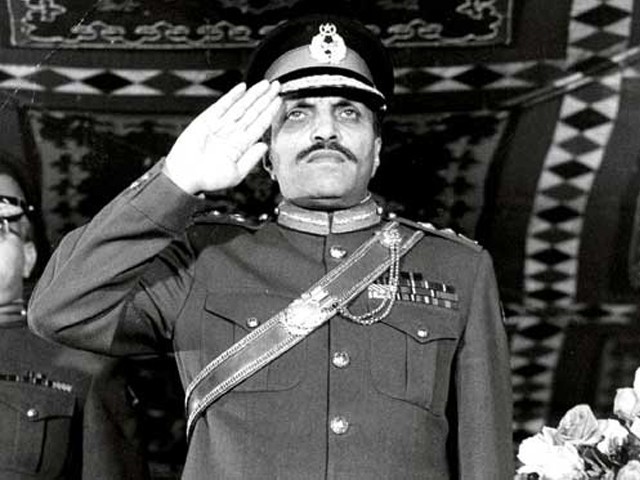“What is a constitution? It is a booklet with twelve or ten pages. I can tear them away and say that tomorrow we shall live under a different system. Today, the people will follow wherever I lead. All the politicians including the once mighty Mr. Bhutto will follow me with tails wagging.”
―Muhammad Zia Ul Haq
General Muhammad Zia Ul Haq was the one who enforced Martial Law for the third time in the brief history of Pakistan. On July 5, 1977, he carried out a bloodless coup overthrowing Bhutto’s government and enforced Martial Law in the country. Born in Jallander, His thoughts were shaped by personal and national traumas: the violent partition of British India in 1947, which created the state of Pakistan, two agonizing wars with bigger rival India over Kashmir, and the breaking away of its eastern province, now Bangladesh, in 1971. His own hometown, Jallander, was left in India after Partition.
After the partition of India in 1947, Zia joined the Pakistani army. Zia was on active duty in Kashmir during the 1965 war between India and Pakistan.
His devoutness, professionalism and seemingly apolitical views appealed to then-Prime Minister Zulfikar Ali Bhutto, who did not consider Zia a threat and promoted him over more ambitious senior officers to become his chief of army staff. But within a year Zia outmaneuvered Bhutto, declared martial law, and in 1979 had Bhutto hanged.
In 1979, Haq launched a vigorous movement to change the liberal nature of the constitution. Zia saw Islamization as a means of strengthening the Pakistanis identity as a Muslim state, threatened by powerful neighbors India.
Zia Ul Haq introduced Islamic laws, Islamized the educational curriculums, opened up thousands of religious seminaries across the country, inducted Islamists into the judiciary, bureaucracy and the ground forces, and created institutions headed by Islamic clerics to oversee the affairs of the government.
History was re-written to stress Islamic roots in the foundation of Pakistan, ignoring the reality. Since 1979, Wahabbi type Islam was promoted in Pakistan by funding from Gulf monarchies especially Saudi Arabia. It was under his tutelage that religious radicals became pillars of the regime, shaping policy and making alliances with the military and intelligence services that endure today.
The war against Soviets in Afghanistan began to indoctrinate students to undertake Jihad against Soviets, leading to the creation of Taliban and other terrorist groups. Many of these activists were later recruited by the Pakistani army to fight a proxy war against India. Day.
During this operation, the military was portrayed as dominant protectors of the Pakistani state and Islam. Until Zia came to power, the principal role of the military had been to protect Pakistans borders and maintain internal security, but under Zia, it became a defender of Islam.
Islamic philosophy became mandatory as part of the instruction of the officer corps. Prayer in the regimental mosques became mandatory as part of the education of the officer corps. Even promotions were bases looking at religious piety. This created a fatal alliance between the conservative Pakistani army and reactionary mullahs. The rise in attacks on India through the proxy war is because of this bond. The Pakistani army is a beneficiary of vast sums of American assistance and money—$11 billion since 9/11—the military has diverted a significant amount of these resources to arming itself against India.
Remember In 1981, Sharif joined the Punjab Advisory Board under General Zia Ul Haq and principally rose to public and political prominence as a steadfast proponent of the military government of General Muhammad Zia Ul Haq during the 1980s. In 1988, General Zia dismissed the government of hand-picked Prime Minister Muhammad Khan Junejo, and called for new elections. However, with all the provisional and the national assemblies were dissolved, General Zia Ul Haq retained Sharif as the Chief Minister of Punjab Province, and continued Sharif’s support until his demise. Mian Nawaz Sharif has, throughout his political career, by and large shown little respect for the constitution, parliament and democratic norms and customs. Because of these ‘virtues’ (lack of respect towards the constitution, Parliament and democracy), the Pakistan nation always regarded him as a true heir of General Zia Ul Haq.
The evil that men do lives after them. General Zia UL Haq planted an evil tree and the tree has got root today. Unfortunately India has to take brunt of these evil fruits.
